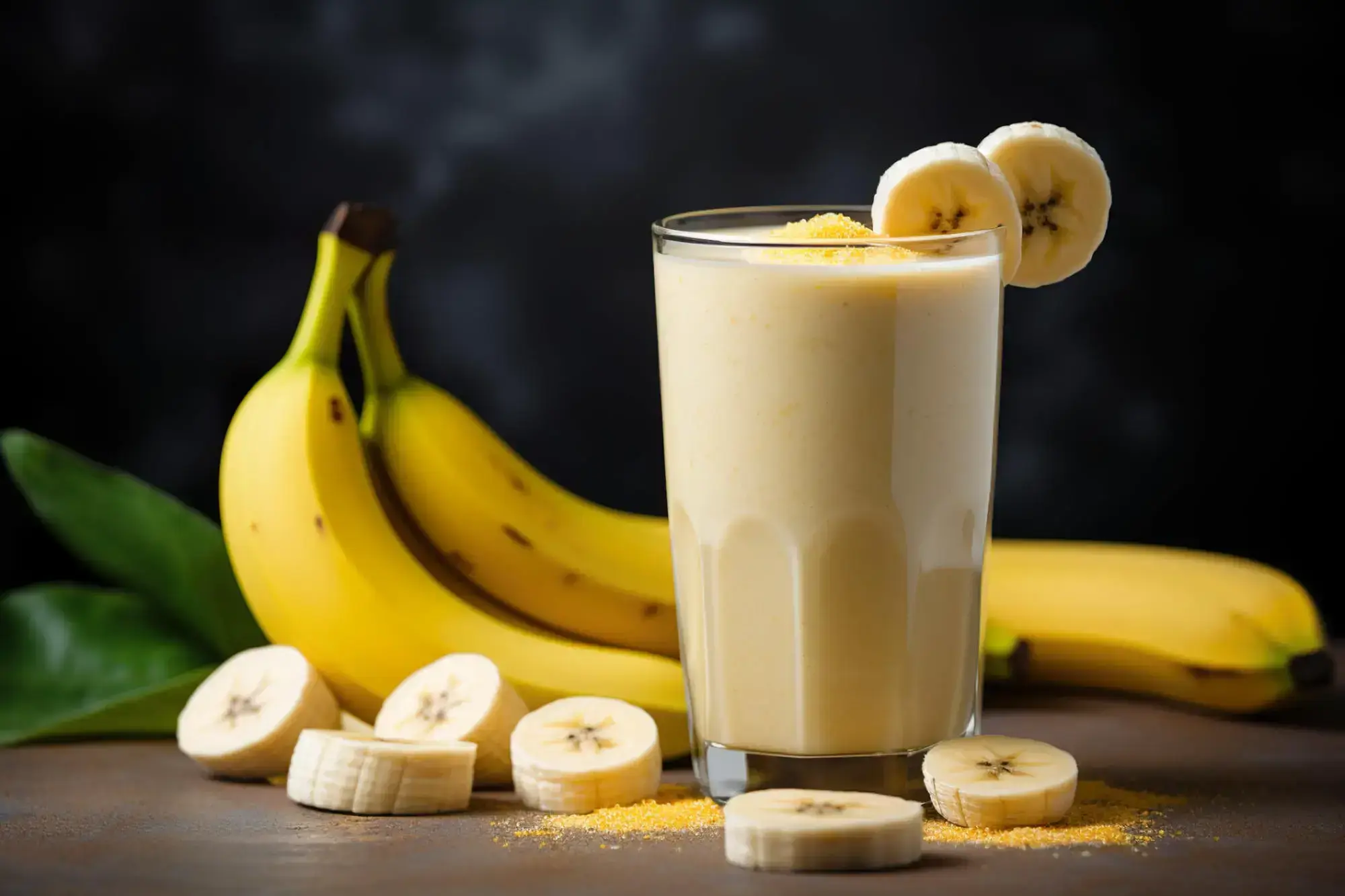- cross-posted to:
- furry_scientists@pawb.social
Researchers have found that the enzyme polyphenol oxidase (PPO) in certain fruits like bananas can reduce the absorption of heart-healthy flavanols, especially when combined with flavanol-rich ingredients like berries. The study suggests choosing ingredients with low PPO activity, such as pineapple or oranges, when making smoothies to optimize flavanol absorption.

i’m gonna go out on a limb and wager that this is an utterly insignificant effect compared to how healthy it is to eat fruits.
Like obviously people have been healthy while consuming banana smoothies, you’re probably going to suffer more from stressing out about minute stuff like this than any possible negative health effects consuming it could bring…

Yeah. I feel like somebody read enough to come up with a clickbait article but not enough to learn anything.
Sort of like when sci-fi writers have a very surface understanding of something, but it’s forgivable because they’re sort of close and it’s good for the story. Except here it’s just an article nobody really needed.

But has this research also factored in that I probably won’t drink the smoothie unless there is a banana in there?

Reject science return to monke.

What if I don’t care about flavanols, but I like the texture a banana produces? What else can make a smoothie smooth like that?

Few ideas -
- Avocados (great texture, not very sweet so other flavors would still stand out)
- Greek yogurt (easy choice for any smoothie with or without bananas haha)
- Mangoes (some varieties are fiberless and blend smooth with a nice consistency)
- cooked sweet potatoes (let cool down to room temp before blending!)
- coconut cream (a small amount can add a creamy texture)
- peanutbutter (or other nut butters) can add thickness to a smoothie.

Sweet potato with strawberry is actually an amazing smoothie combination.

Frozen fruits that are high in pectin. Chia seeds.

Peanut butter… Banana… Strawberry… Dark chocolate… Mm

The thing they are missing is that I don’t drink smoothies because they’re healthy, I drink them because they taste good

It’s what I have to remind people when they are trying to change their diet to get in shape and lose weight.
I tell them, your not eating for enjoyment, your eating to fuel your body.
I was very fit, but I was eating like canned tuna and Greek yogurt, not mixed but one after another. That’s not a delicious lunch, but it was just the nutrition that was needed.

your not eating for enjoyment, your eating to fuel your body
Yeah? Well, you know, that’s just like uh, your opinion, man.

your not eating for enjoyment, your eating to fuel your body.
This is the number one cause why diets get abandoned and people gain weight again. Adding a little enjoyment to the diet goes a long way towards long term compliance.
I feel fortunate because to me what that person described actually does sound enjoyable and satisfying. I will straight up eat handfuls of raw spinach because I enjoy it. You’d be surprised by how many people feel compelled to share their disgust, though, which is one reason I prefer to eat alone.

This feels like a really bad mindset to me, it’s absolutely possible to eat healthily and still enjoy food and i see little reason to not do so.

Your right, it just depends on your goals. I always have myself a cheat day.
Dinner would be decently big. Like quinoa and a bunch of chicken breast.

That’s dry af. I think some people are just ok eating something that has literally no flavor. A lot of “healthy” recipes need: salt, pepper, garlic, onion, oregano, paprika, chili powder, oil, mustard, honey, etc.
Like literally sprinkle salt and pepper on the chicken, garlic and oregano if you’re feeling crazy. Stop eating plain chicken!

i think many people have this idea that healthy food somehow has to be boring and flavourless, and that if you make it in any way enjoyable it for some reason automatically becomes unhealthy.
Which is insane and a terrible idea to spread, at this point i think healthy food tastes better.

For some of us, the joy of good food is the only reliable joy we have.

Oh, yeah. I totally eat for comfort and enjoyment now. But if your trying to lose weight and have a flat stomach it’s hard work and most people need to sacrifice comfort food.
Once you get there, you can eat a bit better. It’s just getting there that’s tough.

Careful with tuna. It’s an important part of my diet as well but I try to mix it up because of heavy metals.

Yes, you really shouldn’t eat tuna more than like 2-3 times a week because of the mercury content.

My scrawny ass, turning my banana smoothies into 1,000 calorie shakes to get gains:

I have a super tall friend who can’t gain weight. No matter what he tries, he is super lanky.

Eat more is usually the correct advice there. If you’re used to eating at a low maintenance intake it can be very difficult to actually get used to eating a surplus of calories, so you end up feeling full and eating way less than you think. Count them calories.
I’ve had success with drinking calories (big thousand calorie shakes) and spreading out meals/snacks every 2 hours.

Yeah, he was doing some kind of shake at some point.

It isn’t too hard to lose weight if that is your main goal, it just takes time. You don’t have to give up food that tastes good or that you love. Just eat under your TDEE and you’ll lose weight. Every meal can be a cheat meal. A food scale and counting calories are the only things you need. I’ve lost 30 pounds so far without doing any exercise and have lost 6 inches off my waist. There was a whole sub dedicated to it called r/CICO. I only need to lose 20 more pounds until my goal weight. I don’t eat food I don’t enjoy, that would be like torture to me.

Hell you don’t even need to count calories, simply eating things that are higher in fibre and generally lower calorie will help bias you toward weight loss.
For example the weight watchers have made fruit a freebee, because it’s basically impossible to get fat from eating fruit.
I’ve never properly counted calories, i just make sure the base ingredients of my diet are generally healthy and that has worked extremely well.
No stress, easy to manage, and i’ve been able to get back in tune with my body’s feedback so i can eat intuitively. I viscerally feel what nutrients my body needs the most (and very much doesn’t need), like how people in survival situations get cravings for stuff like fish eyeballs because it has vitamins they need.
Yeah that doesn’t work for me, I actually enjoy eating food so eating “intuitively” makes me eat too much. That was a common complaint on r/CICO that eating intuitively made people regain their lost weight. There is a reason why people like me got fat in the first place lmao. Over-eating tasty food.
Once I learned what actual serving sizes are supposed to look like it got much more easy. It’s not stressful to count calories, I found it immensely stressful when I thought I was eating healthy low calorie meals but when I counted the calories using an actual scale I was actually over-eating and hated every second of it since I still felt hungry all day and the food tasted bad. Now I eat whatever I want or crave. I’m not on a diet, I just adjust my portions. Once you get the hang of it, you can visually confirm you are eating too much or too little. This is how I like eating, nothing is off limits and very easy to tap a few times on my phone. My cheat day is everyday and I still lose weight. If I ever crave fish eyeballs, you can safely shoot me in the head lol.

I also enjoy eating, i need to eat good food to enjoy the rest of the day.
But you can absolutely eat intuitively while enjoying food, i think the mistake many people make is confusing “intuitive” with “follow every single urge no matter what”.
no, you have to learn to interpret your bodily feedback, it takes like maybe a year to learn what your body actually wants because at first you will simply be following surface level psychological desires.
Part of this is simply weaning yourself off of sugarI used to constantly drink cola and eat snacks and candy, nowadays after a glass of soda i feel a profound urge to drink nice cold water and i barely eat snacks or candy because actual food is more satisfying.
As for overeating and learning what serving sizes look like… that’s just like the definition of intuitive eating? simply knowing how much you want.

I mostly drink water and tea so soda now feels too icky to drink but that hasn’t stopped me from enjoying other desserts. I don’t see myself giving that up lol I love it too much. If it works for you, then kudos to you. I just can’t dedicate myself to it. Especially not an entire year. I hope you don’t think I am putting you down or anything, if it works for you then you should stick to it.
That’s not the definition of intuitive eating, at least I’m pretty sure it isn’t. I look at the serving size of whatever I am eating on its packaging label, weigh it, log it, and eat it. I only eat that predetermined amount the manufacturer came up with. I don’t say maybe I’ll eat double this amount or half because my body feels differently that day. I eat the exact same thing of something every time I eat it. I stop eating when I’ve met my calorie count, not when my body feels sated. That’s calorie counting. As long as I eat throughout the day, I don’t feel much hunger. I’m pretty sure I have a slow metabolism and eating whatever I want in smaller portions has been working for me.

Ugh can’t even come to lemmy to escape real life - spent most of Monday morning denaturing/counteracting PPO in my uni food science lab!
Polyphenol oxidase is the enzyme responsible for browning in shit like apples and potatoes when cut and exposed to air.
I haven’t read the study linked in the OP yet (and I’m far too sad and intoxicated for it right now) but in other fruits/vegetables it’s pretty easy to deactivate PPO through application of some combination of Vitamin C (converts quinones back to their phenol form and reacts with oxygen before it can get to the PPO) and heat (which actually denatures the PPO enzymes).
When we were denaturing PPO in potatoes in a lab setting we simply blanched the sliced potatoes in 90°C water for 5 minutes before placing it in an ice bath until cool.

I’m far too sad and intoxicated
Yep, this man/woman is definitely a scientist working at a university.
Thanks for the information and I hope your next experiment goes well.

Right? Insert a little bit of lemon juice and the polyphenol oxidase shouldn’t be a problem anymore. Also, banana wouldn’t be the only problem (concerning high polyphenol oxidase activity), would it? Cut up an apple and it turns brown before you can push all pieces into a juicer. Literally, I’ve had a couple R&D projects at the juice company I used to work for and we had this small Angel Juicer and by the time all apple pieces were in, the juice was brown (provided I didn’t spritz in lemon juice at the beginning).

Submerging apple slices in water with a bit of salt prevents browning. Doesn’t change the flavour like lemon as not much salt needed.

Hey, I know I’m like two days late to reply, but you probably wouldn’t need the salt even. The polyphenoloxidase reaction is what the name suggests, an oxidation. So it requires plenty of oxygen to run, which probably is inaccessible in water, I would assume.
I actually wasn’t quite sure anymore if I had that right and when googling it, I managed to find an entire diploma thesis on the polyphenoloxidase reaction, so for anyone that’s interested in it more deeply (sorry, it’s in German aside for the abstract, which is in English, too), have fun c:

My experience is from preparing sliced apples to eat later. Dip them in slightly salted water for less than a minute and they’ll hold for quite some time. No need to carry water in the container. The salt must help create an insulation membrane against oxidation. This is all practical experience and I haven’t seen research on it.

So basically, just add a bit of lemon juice to your smoothie?

I’m not confident saying for sure without reading the actual paper - it really depends on how PPO interacts with the flavanols, but at the end of the day denaturing the PPO with heat should make it a non-issue. Keep in mind though that bananas are far from the only smoothie ingredient with PPO!

Or add cooked banana instead? Heat it up before freezing that over ripe banana.

This article assumes I am drinking smoothies purely for the flavanoids.

I drink 'em for the flava. Not the noids.

Avoid the Noid

I mean, the #1 reason is because it makes it taste like banana.

Handful of strawberries. Handful of blueberries. Half cup of pineapple juice. Cup of crushed ice. 1 whole banana. Blended well.
Super smooth dairy free smoothie and all you taste is the other fruit.

How can I add some sort of dairy flavour?

Milk

Yogurt is usually what thickens a shake. A half cup or so (maybe more idk; I don’t usually use it that’s what the banana is for) of unflavored plain yogurt.

Yoghurt or Coconut CoYo

I freeze the fruit and use no ice, and add oats and nuts or seeds for bulk.

I’ve had many people try to sneak banana in, I can ALWAYS taste it. It’s like the pleasant cousin of cilantro.

Ottaviani said tea is a major dietary source of flavanols and depending on how it is prepared, a different amount of flavanols would be available for absorption.
Dammit, you can’t just say that and not give any detail!

I’m not in the right headspace to read any studies on it but based on my understanding of how food works on a chemical level I’d say it’s a safe bet to say that the difference in preparation is mostly down to heat and steeping time.
If you steep for longer it gives the water more time to absorb flavanols.
If you use a temperate that is too high you’ll denature or destroy the flavanols, whereas if you use a temperature that’s too low they may not dissolve into the water as readily necessitating a longer steeping time.

Yeah I was thinking temperature. For example, you’re not supposed to use boiling water for green tea, as it burns the tea. I’ve noticed this with many brands, however each brand tends to be a bit different - some are more tolerant to higher temperatures than others.
I imagine you can also do a multi-stage extraction, where you heat at a lower temperature and then at a higher temperature. This should avoid denaturing the lower temp compounds. It’s commonly done with alcohol when extracting sugars into the wort.
It’s not a big mystery. Green tea has the most amount flavanols. Fresh leaves also have more compared to aged leaves. Also, powered forms of tea release them more quickly compared to loose leaf. However, you could just steep regular leaf tea for longer as well. The key thing to remember is to not use boiling water, as that may degrade the flavanols, so select a temperature just-below boiling (80-90C / 175-195F).


